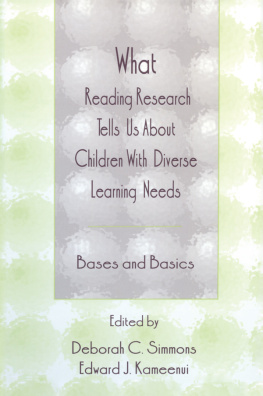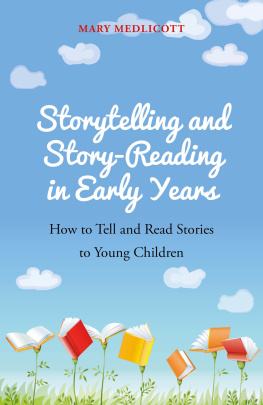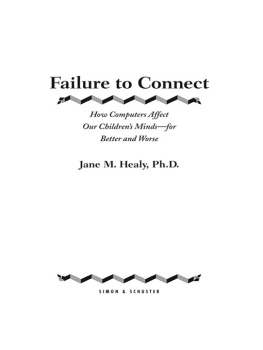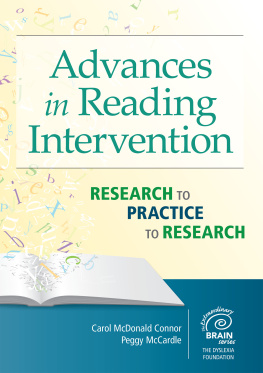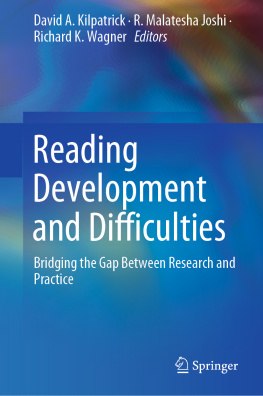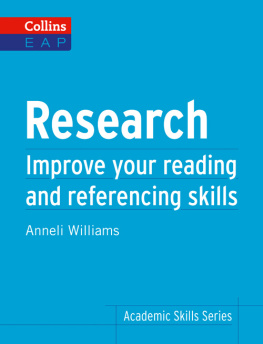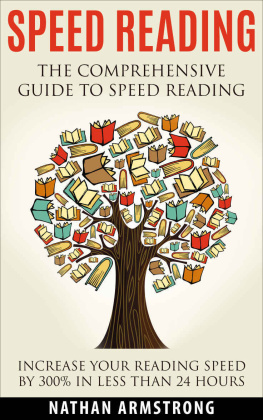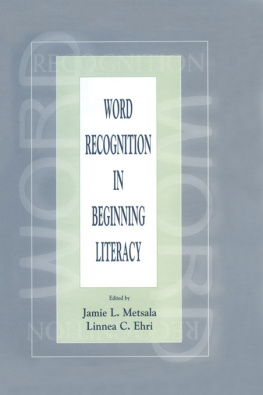What Reading Research Tells Us
About Children With Diverse
Learning Needs
Bases and Basics
What Reading Research Tells Us
About Children With Diverse
Learning Needs
Bases and Basics
Edited by
DEBORAH C. SIMMONS
EDWARD J. KAMEENUI
University of Oregon
Copyright 1998 by Lawrence Erlbaum Associates, Inc.
All rights reserved. No part of the book may be reproduced in
any form, by photostat, microform, retrieval system, or any other
means, without the prior written permission of the publisher.
First published by
Lawrence Erlbaum Associates, Inc., Publishers
10 Industrial Avenue
Mahwah, New Jersey 07430
This edition published 2012 by Routledge
Routledge | Routledge |
Taylor & Francis Group | Taylor & Francis Group |
711 Third Avenue | 2 Park Square, Milton Park |
New York, NY 10017 | Abingdon, Oxon OX14 4RN |
Cover design by Kathryn Houghtaling Lacey
Library of Congress Cataloging-in-Publication Data
What reading research tells us about children with diverse learning
needs: bases and basics/ edited by Deborah C. Simmons, Edward J.
Kameenui.
p. cm.
Includes bibliographical references and indexes.
ISBN 0-8085-2515-0 (cloth: alk. paper). -- ISBN 0-8058-2516-9
(pbk.: alk. paper)
1. Reading disability. 2. Reading-Research. 3. Reading
-Remedial teaching. I. Simmons, Deborah C. II. Kameenui, Edward
J.
LB1050.5.W47 1998
372.43--dc21 98-25644
CIP
Contents
Introduction
Deborah C. Simmons and Edward J. Kameenui
Emergent Literacy: Research Bases
Barbara K. Gunn, Deborah C. Simmons, and Edward J. Kameenui
Emergent Literacy: Instructional and Curricular Basics and Implications
Barbara K. Gunn, Deborah C. Simmons, and Edward J. Kameenui
Phonological Awareness: Research Bases
Sylvia B. Smith, Deborah C. Simmons, and Edward J. Kameenui
Phonological Awareness: Instructional and Curricular Basics and Implications
Sylvia B. Smith, Deborah C. Simmons, and Edward J. Kameenui
Word Recognition: Research Bases
David J. Chard, Deborah C. Simmons, and Edward J. Kameenui
Word Recognition: Instructional and Curricular Basics and Implications
David J. Chard, Deborah C. Simmons, and Edward J. Kameenui
Vocabulary Acquisition: Research Bases
Scott K. Baker, Deborah C. Simmons, and Edward J. Kameenui
Vocabulary Acquisition: Instructional and Curricular Basics and Implications
Scott K. Baker, Deborah C. Simmons, and Edward J. Kameenui
Text Organization: Research Bases
Shirley V. Dickson, Deborah C. Simmons, and Edward J. Kameenui
Text Organization: Instructional and Curricular Basics and Implications
Shirley V. Dickson, Deborah C. Simmons, and Edward J. Kameenui
Metacognitive Strategies: Research Bases
Shirley V. Dickson, Vicki L. Collins, Deborah C. Simmons, and Edward J. Kameenui
Metacognitive Strategies: Instructional and Curricular Basics and Implications
Shirley V. Dickson, Vicki L. Collins, Deborah C. Simmons, and Edward J. Kameenui
CHAPTER
Introduction
Deborah C. Simmons
Edward J. Kameenui
University of Oregon
ISSUES AND CHALLENGES IN READING ACHIEVEMENT
Professional educators and the public at large have long known that reading is an enabling skill that traverses academic disciplines and translates into meaningful personal, social, and economic outcomes for individuals. It is common knowledge that reading is the fulcrum of academics, the pivotal ability that stabilizes and leverages childrens opportunities to learn and to become reflective, independent learners. Despite societys long recognition of the importance of successful reading, only recently have we begun to understand the profound and enduring consequences of not learning to read and the new-found evidence of the critical and abbreviated period in which we have to alter reading trajectories (California Department of Education, 1995; Juel, 1988; Lyon & Chhabra, 1996).
One need not look beyond the school dropout data, prison rosters, or recipients of federal public assistance to find that poor reading ability is pervasive and common to many who are not succeeding in todays societya society whose literacy demands continue to galvanize the distinctions between the haves and have nots. Studies of individuals who are resilient to personal and societal adversity indicate that the ability to read has powerful and far-reaching positive effects and, likewise, the converse. Literacy level is both negatively associated with lower annual earnings and higher unemployment. The absence of proficient reading skills is a considerable risk factor associated not only with academic failure and school dropout but unemployment and adjudication (Cornwall & Bawden, 1992; Werner, 1993). Stanovich (1986) drew parallels between a biblical proverb and the domain of reading noting that the rich get richer and the poor get poorer. In that parallel, he observed that readers who read early and successfully not only reap the advantage of early literacy but accumulate experiences with print that continue to differentiate and discriminate between good and poor readers throughout their academic careers. Unfortunately, the rich get richer phenomenon has been verified not only in academic but also in economic domains. Individuals who test in the least proficient literacy levels are often unemployable as even low-skilled jobs demand adequate reading abilities (Whitman, 1995). According to a survey of more than 3,000 employers in Atlanta, Boston, Detroit, and Los Angeles, economist Harry Holzer found that only 5 to 10 percent of the low-skilled job openings in these cities were available to applicants (p. 31) with low literacy skills (cited in Whitman, 1995). If the relation between reading and other desirable outcomes is so strong, trends from national data suggest we have just cause for concern.
Reports on progress toward the National Education Goals reported by the Department of Education (National Center for Education Statistics, 1993) found that 90 million of Americas 191 million adults (47%) either are illiterate or can perform only simple literacy tasks. Findings from the 1994 National Assessment of Educational Progress (NAEP), a federally supported program that monitors the progress of students in core academic areas, indicated that 25% of the 38 states participating in both the 1992 and 1994 fourth-grade assessments showed a significant decrease in reading proficiency over the 2-year period. On average, fourth graders in the 1994 assessment scored only one point above the basic level of 212 with the proficient (243) and advanced (275) levels far out of reach. Four of 10 fourth graders (42%) among schools surveyed were reading at a below basic level (National Center for Educational Statistics, 1996).
An increasing number of children are failing to learn how to unlock the meaning and opportunities that printed words can avail. The NAEP 1992 and 1994 data found that children who are Black or Hispanic, are poor, born to parents who are less educated, and do not live in two-parent family structures are more likely to have low literacy skills than children who are White, wealthy, have educated parents, and hail from Norman Rockwell-type families. Nevertheless, the overall decline in 1994 NAEP Reading Assessment was not restricted to particular subgroups of students. Rather, a broad range of subgroups showed significant decreases in reading proficiency, including male and female students; White, Black, and Hispanic students; and students from the northeast, central, and west regions of the country (National Center for Educational Statistics, 1996, p. xi).

